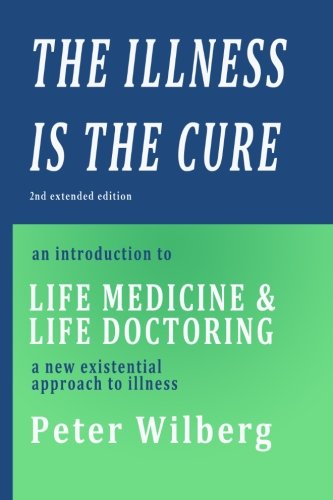Medicine, Life and Science
In a way intended to be of help to both
patients and health professionals, this book challenges one of the
most basic assumptions shared by almost all
forms of medicine –
conventional or ‘alternative’, ‘scientific’, ‘traditional’
or ‘spiritual’. This is the assumption that illness is something
to be cured
rather than being
the cure.
To challenge this basic assumption, I
introduce a fundamentally new ‘existential’ approach to health
and illness which I call ‘Life Medicine’ and ‘Life Doctoring’.
Life Doctoring and Life Medicine
offer patients opportunities to come to an understanding of how and
in what ways their illness is
itself the cure – offering a
source of new healing
understandings of themselves
and a healing
transformation
of their lives.
For in contrast to both ‘orthodox’
and ‘alternative’ medicine – each of which in their own ways
seek nothing but ‘causes’ and ‘cures’ for illness – Life
Medicine and Life Doctoring do
not separate
science and life, biology from biography, the life of the human
body and the life of the human
being. Instead the focus is on
the larger life context
and specific life meanings
that particular symptoms and illnesses hold for the individual
patient. For as Marx wrote:
“The idea of one basis for science
and another for life is from the very outset a lie.”
This ‘lie’ unfortunately has dire
consequences of which too few are aware. For research by the medical
establishment itself has shown that conventional biomedical diagnosis
and treatment
through drugs and surgery is
itself the
leading cause of premature death – ahead of both cancer and heart
disease.
By offering an entirely new framework for
understanding health and illness,
Life Medicine and Life Doctoring
can help patients to not only understand the underlying sense of
‘dis-ease’ in
their lives
that lies behind their illness. Life Medicine and Life Doctoring can
also serve a vital preventative
role by (a) preventing this
‘dis-ease’ manifesting further as clinical
‘disease’, and (b) educating
patients about the possible dangers and potentially sickness-causing
or ‘iatrogenic‘ effects of many standard forms of biomedical
testing and
treatment.
Both biomedical and ‘alternative’
explanations of illness are
comparable in many respects to the way in which scientists sought to
‘explain’ dreams before Freud
– denying them all meaning.
Yet what if the symptoms are comparable to disturbing dream symbols
and experiences – both expressions of a felt ‘dis-ease
’? What if illnesses are a type
of embodied dream or ‘body dream’? Then deep understanding
and not just medical-scientific ‘explanation’, testing and
treatment is required.
For again, to ‘explain’ an illness is
one thing. Yet to understand
it is quite another. For understanding has to do with meaning.
Yet so-called ‘biological’ medicine does not even recognise or
understand the root meaning of the very term ‘biology’ itself –
which does not refer to a set of specialist sciences, but rather to
the ‘speech’ (Greek logos)
of ‘life’ (Greek bios).
Speech carries and communicates meaning. Nothing could be further
from the root meaning of ‘biology’ then, than the so-called
biological ‘sciences’ – which reduce the life, language and
‘speech’ of the human body itself to a mere molecular
‘expression’ of its genes.
That is why, as Martin Heidegger
wrote: “The
essential realm in which biology moves can never be grounded in
biology as a science.” For
the realm in which biology moves is a realm of living and embodied
meaning. In contrast, what most fundamentally defines the ‘biomedical
model’ of medicine – based as it is on “biology as a science”
–
is the way it totally denies any personal
life meaning to illness –
and in particular the exact timing, life situation and larger life
context in which an individual’s symptoms first emerge. On the
contrary, by merely seeking to fit a person’s symptoms into the
frame of wholly impersonal diagnostic or statistical criteria, and
then treating their illness with no less impersonal methods of drug
or hi-tech treatment, biomedicine can aggravate
the very sense of personal
meaning loss
that lies behind most illnesses –
as well as damaging rather than healing patients’ bodies, and even
endangering their lives.
The continuing monopoly
of biomedicine over our entire understanding of and approach to
illness has one reason and one reason only – namely that it is not
actually ‘science driven’ but ‘money driven’ – turning
illness into a source of vast profits for the drug companies and
manufacturers of hi-tech medical equipment. Indeed ‘health’
itself is increasingly defined merely in monetary terms –
as the patient’s capacity for ‘employment’ as a wage-slave and
to ‘function’ economically as a profit-source for employers.
Many people are concerned about the
rising costs of public health care or angered by a global trend
towards the privatisation of health services. Yet the roots of this
trend lie in the fact that illness
itself has long been
‘privatised’ – seen as bearing no relation at all to the social
and economic ‘ills’ affecting the patient. To declare that ‘the
illness is the cure’ is also to recognise that the ‘cause’ of
illness does not lie in the individual alone but also in the world –
and that illness itself is in part a healthy
response to a fundamentally sick
world –
and this way also helps to heal
that world.


No comments:
Post a Comment